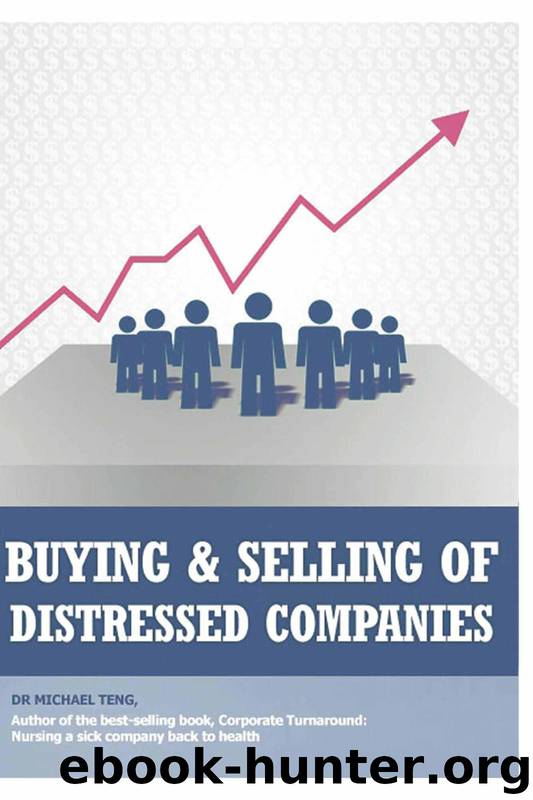Buying and selling distressed companies by Michael Teng

Author:Michael Teng [Teng, Michael]
Language: eng
Format: mobi
Published: 2012-06-21T14:00:00+00:00
MERGERS, ACQUISITIONS, TAKEOVERS
A distressed company is often the target of a merger or a takeover because of its low valuation or low bargaining power. You, as an investor, may want to invest in a distressed company by merging your business with a distressed business. If you do not have an existing business, you can acquire or take over a distressed business and become its owner.
Let's now look at the three terms more closely. Although used in the same breath, the terms merger and acquisition have slightly different meanings.
MERGER
Merger is the combination of two or more businesses into one single business where one business survives and the other looses its existence. The surviving business acquires the assets as well as the liabilities of the merged business. Usually the business which survives is the buyer which retains its identity and the selling business is extinguished. All assets, liabilities, and stock of one business stand transferred to the transferee business in consideration for payment in the cash, shares or both. The main objective why businesses merge is to achieve growth and efficiency through economies of scale.
ACQUISITION
Acquisition in a general sense is acquiring ownership in the property. In business terms, an acquisition is the purchase by one business of a controlling interest in the share capital of another business.
An acquisition may be affected by:
1. Any agreement with the persons holding majority and controlling interest in the management of the business like members of the board or major shareholders commanding a majority voting power.
2. Purchase of shares of the business in the open market
3. Making a takeover offer to the general body of shareholders
4. Purchasing new shares through a private treaty
A takeover is also an acquisition and both terms are used interchangeably. Takeover differs from merger in approach to business combinations i.e. the process of takeover, the takeover transaction, determination of the share exchange or cash price and the fulfilment of goals of the combination are all different in takeovers than in mergers. The process of takeover is unilateral and the offeror business sets the maximum price. Time taken in completion of the transaction is less in takeover than in mergers.
PURPOSE
Acquisition is one method that a business can use to achieve massive growth literally overnight, and this is by buying another business. Acquisition has become one of the most popular ways to grow today. Businesses can grow by acquiring others to increase market share, to gain access to promising new technologies, to achieve synergies in their operations, to tap well-developed distribution channels, to obtain control of undervalued assets, and a myriad of other reasons. But acquisition has to be well thought out and planned, if it is to be successful and achieve the desired objective of the owner(s). Because of the appeal of instant growth, acquisition is an increasingly common way for businesses to expand.
The business which proposes to acquire another business is known differently in different jurisdictions. The common and familiar ones in most jurisdictions are predator, offeror, raider, etc. The transferee business is called the victim, offeree, target, etc.
Download
This site does not store any files on its server. We only index and link to content provided by other sites. Please contact the content providers to delete copyright contents if any and email us, we'll remove relevant links or contents immediately.
Rich Dad Poor Dad by Robert T. Kiyosaki(6640)
Pioneering Portfolio Management by David F. Swensen(6303)
How To Win Friends and Influence People by Dale Carnegie(4513)
The Money Culture by Michael Lewis(4210)
The Dhandho Investor by Mohnish Pabrai(3769)
The Wisdom of Finance by Mihir Desai(3750)
Liar's Poker by Michael Lewis(3451)
Fooled by Randomness: The Hidden Role of Chance in Life and in the Markets by Nassim Nicholas Taleb(3125)
The ONE Thing by Gary Keller(3072)
Mastering Bitcoin: Programming the Open Blockchain by Andreas M. Antonopoulos(3046)
The Intelligent Investor by Benjamin Graham Jason Zweig(3043)
The Psychology of Money by Morgan Housel(3038)
Rich Dad Poor Dad: What The Rich Teach Their Kids About Money - That The Poor And Middle Class Do Not! by Robert T. Kiyosaki(2958)
Investing For Dummies by Eric Tyson(2955)
How to Day Trade for a Living: Tools, Tactics, Money Management, Discipline and Trading Psychology by Andrew Aziz(2949)
How to Win Friends and Influence People by Dale Carnegie(2918)
Market Wizards by Jack D. Schwager(2702)
How to Pay Zero Taxes, 2018 by Jeff A. Schnepper(2655)
Zero Hour by Harry S. Dent Jr. & Andrew Pancholi(2649)
